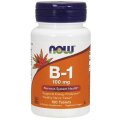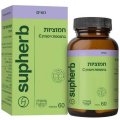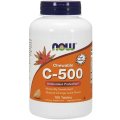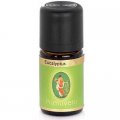You may be interested in these similar products:
Specialty Formulas
SupHerb - Optic Guard
Age-Related Macular Degeneration (AMD) is the name given to a group of conditions that affect the cells found in the macula, at the center of the retina. AMD is the number one cause of vision problems among those aged 55 and abovе. The incidence of this disease increases with age. In the United States, one in six people aged 55 and above suffers from vision problems as a result of AMD, and some 20,000 people will lose macular vision, in one or both eyes, each year.
Because the brain has the ability to fill in incomplete images received from the eye, the majority of sufferers only see an eye doctor when the damage done to the eye is already at an advanced stage.
Science does not yet have a complete picture of the factors causing the disease, but a significant body of research today indicates that there is a connection between lifestyle - nutrition, smoking and wearing sunglasses - and the risk of developing the disease. This is in addition to genetic factors, which are the primary factor involved in the disease's appearance.
A number of factors are involved in the development of AMD:
* Oxidative Stress
The retina is made up of many layers of cells, and these cells contain a high concentration of poly-unsaturated fatty acids (PUFA), mitochondria and oxygen.
Consumption of oxygen in the eye is the highest of all the organs, and, this generates a large concentration of free radicals, which can damage the fatty acids found in the membranes of the eye. An imbalance between the rate of formation of free radicals and the concentration of antioxidants causes a situation called oxidative stress.
With age, the body is less able to cope with the formation of free radicals and the damage that they cause to the various body systems, among them the eyes, increases continuously.
* Nutrient Deficiency
Vision requires large amounts of oxygen and nutrients. In order to handle the demands for nutrients and oxygen, the eye has an extensive network of blood capillaries. Any damage to these blood vessels impacts the rate of transfer of materials, and thus affects the ability to see.
* Smoking
Smoking causes the blood vessels to constrict and thicken. It has been found that the incidence of AMD is higher among smokers than among non-smokers.
* High-Cholesterol Diet
A diet high in fats and cholesterol leads to an increase in LDL (low density lipoprotein) cholesterol in the blood. The oxidation of LDL cholesterol produces molecules that have a tendency to adhere to the walls of the blood vessels, eventually causing obstruction to blood flow.
* Diet Low in Antioxidants
Fruits and vegetables contain nutrients that protect the cells of the eye from the effects of oxidation, and keep the capillaries in the eye free of obstructions. Research has been carried out into the relationship between the consumption of food rich in antioxidants (Vitamins A, C, E and carotenoids) and the risk of developing AMD. 356 patients suffering from AMD and 520 healthy people took part in the project. All the participants were aged 55-80. Over the course of a year, information about the subjects` eating habits was collected. It was found that the consumption of foods rich in antioxidants reduced the risk of developing AMD by 43%.
Over the years, clinical research using animals and human subjects has indicated the importance of a number of vitamins, minerals and other nutrients for reducing the risk of developing AMD, reducing the rate at which it develops, and for improving vision.
SupHerb`s Optic Guard formula has been developed on the basis of this research. This formula contains those nutrients that have been found most effective for maintaining the health of the eye, in concentrations offering the highest level of effectiveness.
Main Uses
Optic Guard Formula has a number of uses:
- Slowing AMD
- Improvement of vision (including night vision)
- Antioxidant activity to protect the eye
- Strengthening and improving the flexibility of the eye capillaries.
The Main Advantages of Optic Guard Formula
Unlike other products, Optic Guard is a unique formula developed specifically to protect the eye from Age-Related Macular Degeneration. Its main advantages are these.
|
About the Ingredients
* Lutein
Lutein belongs to the group of substances known as carotenoids. It is not formed in the body, but absorbed from foods. Lutein is found in fruits and vegetables, particularly in leafy vegetables such as spinach.
Lutein is an antioxidant. Its main function is to protect the eye, where it can be found in high concentrations, from the damaging effects of free radicals.
The pigments found in the macula serve as a protective layer for the retina, by filtering the blue light coming from the sun and which creates free radicals in the eye.
In research carried out in Holland, subjects took 10 mg of lutein for a period of three months. At the end of this period, the concentration of pigments in the macula was found to have risen by 22% (42-50). Another research project, at Harvard University, found that supplementing the diet with 6 mg of lutein per day led to a reduction of 19% in the rate of development of AMD.
* Bilberry Extract
Research into the effectiveness of blueberries and bilberries for improving vision began in the 1960`s, as a result of reports by pilots of improved night vision after eating blueberry jam.
Research carried out in the 1980`s in Europe showed the ability of bilberries to shorten the amount of time needed for the eye to adjust to darkness or strong light, to increase visual acuity and to improve blood flow in the capillaries of the eye.
Bilberries contain bioflavonoid substances called anthocyanosides, which have a strong antioxidant effect.
Other important qualities of the bilberry include: improvement of blood flow in the capillaries of the eye, by maintaining their structural integrity; the ability to dilate blood vessels and prevent the adhesion of platelets, which can lead to the formation of blood clots; and promotion of renewed production in the eye of the protein Rhodopsin, essential for night vision (11-18).
* Vitamin C
Vitamin C is one of the water-soluble vitamins. While most animals can produce their own Vitamin C, humans have to obtain it from dietary sources.
As a powerful antioxidant, Vitamin C is important in a number of biological processes. There is also a synergistic effect between Vitamin C and Vitamin E.
Outside the body`s cells, Vitamin C can be found in the blood, and in high concentrations in the eye, where it works on free radicals even before they reach the cells and attack the fatty tissues.
Within the cells, Vitamin C allows the regeneration of Vitamin E, and protects the DNA from damage.
The enzyme glutathione peroxidase is an important participant in the system to neutralize free radicals in the eye. Vitamin C, Vitamin E and the trace mineral selenium serve as building blocks in the formation of glutathione.
In an experiment carried out in Greece, to determine the ability of Vitamins C and E to neutralize free radicals in the retina, nitric oxide was used as an indicator of the concentration of free radicals in the eye. The trial involved 50 diabetes patients, who received supplements of Vitamin C (1,000 IU/day) and Vitamin E (400 IU/day) for 10 days. Levels of nitric oxide were measured before and after the trial. The results showed a significant (p-0.05) reduction in nitric oxide concentrations.
Optic Guard contains Ester C - a patented form of Vitamin C, designed for optimal absorption.
* Vitamin E
Vitamin E is a fat-soluble vitamin, found in the plasma, the red blood cells and in various tissues. Vitamin E has a key role in maintaining the biological integrity of the membranes. In the eye, it is involved in preventing oxidation of fatty acids within the membrane, and in the regeneration of glutathione.
Vitamin E works synergistically with antioxidants such as Vitamin C, selenium, beta carotene, co-enzyme Q-10, and DHA. There is a noticeable difference between the activity of synthetic Vitamin E (dl-alpha-tocopheryl acetate) and that of natural Vitamin E (d-alpha-tocopheryl acetate). The effectiveness of natural Vitamin E is 1.36 times that of the synthetic form.
In spite of the fact that a large number of research projects used dosages of 400-800 IU, the recommended safe dosage for long-term use is 200 IU of natural Vitamin E.
In a research project known as the "Physician Health Study", those doctors who took supplementary Vitamin E reduced their chances of developing AMD by 13%.
* Vitamin A
Vitamin A (like beta carotene) is a fat-soluble vitamin, important in many processes in the body. Vitamin A is the main vitamin involved in vision. It is found in high concentrations in the eye, and takes part in the conversion of the protein opsin to rhodopsin. Rhodopsin serves as a receptor for light, and converts it to energy that is transmitted along the optic nerve to the brain. This process requires a constant supply of Vitamin A, which the eye receives from the blood supply. Night vision requires larger amounts of Vitamin A, and Vitamin A deficiency leads to a vision problem known as night blindness.
* Beta Carotene
This is the main carotenoid involved in the formation of Vitamin A. In addition to providing the body with Vitamin A, beta carotene is an antioxidant substance that prevents radiation damage to the retina and the development of cataracts.
* Selenium
This ingredient is a powerful antioxidant that works in the body in association with Vitamin E. Its main antioxidant effect occurs as a result of its proximity to the active site of the enzyme glutathione peroxidase. This is the enzyme responsible for the breakdown of free radicals (hydroperoxides). In order to prevent deficiency, a daily intake of 55-75 mcg of selenium is recommended.
* Zinc
This mineral is involved in many biochemical processes in the body, and the highest concentration of zinc in the body is found in the eye. Research has shown that zinc deficiency leads to an increase in the level of oxidation stress.
There is a correlation between aging, lowered zinc levels and the increase in the risk of developing chronic illness. The drop in zinc levels comes about as a result of reduced concentrations of the enzymes glutathione catalase and superoxide dismutase, which operate against the many oxidants generated by vision processes.
Zinc is also important for vision because of is influence on the levels of Vitamin A in the eye.
The results of the trial showed that:
1. The best combination for preventing AMD was to take antioxidants in combination with zinс.
2. The biggest contribution of antioxidant dietary supplements was to the group with the highest risk of AMD. In this group a decrease of 25% in the rate of development of the disease was recorded.
*Copper
Because zinc is known to be an antagonist to copper, thus causing anemia, in order to maintain the proper balance between copper and zinc in the body, Optic Guard Formula has been enriched with this mineral.
* Vitamin B2 (Riboflavin)
In the eye, Vitamin B2 is involved in the production of flavin adenine dinucleotide (FAD), which serves as a co-factor for the production of the enzyme glutathione reductase.
* Ginkgo Biloba Extract
The leaves of this medicinal herb contain active antioxidant components called ginkgoflavoglycosides, which are unique to this plant.
* Citrus Bioflavonoid and Quercetin
These two nutrients are bioflavonoids found in fruits. These flavonoids provide protection to the eye, both as antioxidants and as a result of their ability to maintain the integrity of the blood capillaries, thus permitting proper blood flow to the eye.
Directions: One tablet per day, with meals.
Ingredients:
Each tablet of SupHerb`s Optic Guard Formula contains:
Lutein.........................................................................................................10 mg
Vitamin C (Ester C).....................................................................................150 mg
Bilberry Ext. (25 mg anthocyanidins [25%] )...............................................100 mg
Citrus Bioflavonoid.......................................................................................60 mg
Quercetin.....................................................................................................50 mg
Zinc picolinate (8 mg Elemental).................................................................40 mg
Ginkgo biloba Ext. (Ginkgoflavoglycosides [24%])......................................30 mg
Vitamin B2...................................................................................................10 mg
Copper gluconate (1 mg Elemental)............................................................1.02 mg
Selenium (as L-Selenomethionine) (100 mcg Elemental)............................500 mcg
Beta Carotene...............................................................................................7,500 IU
Vitamin A.......................................................................................................2,500 IU
Natural Vitamin E (D-Alpha Tocopheryl Succinate)......................................100 IU
SupHerb's Optic Guard Formula is available in packages of 72 tablets.
Made in Israel
Kosher
**This product is not intended to diagnose, treat, cure or prevent disease.
- Barcode: 7290011651879
- Shipping Weight: 0.33kg
- Manufactured by: SupHerb - Natural Food Supplements
There are currently no product reviews.







